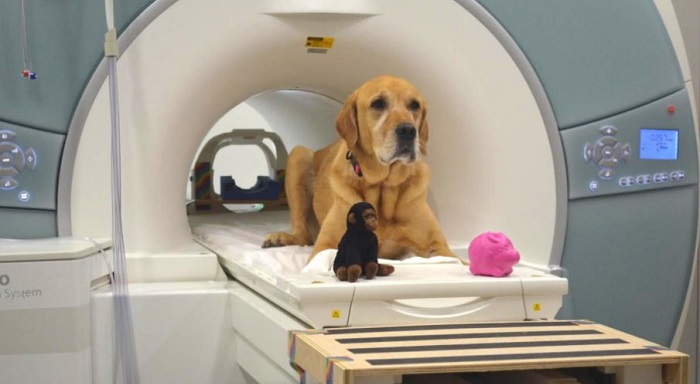Mettez-vous hors ligne avec l'application Player FM !
Dog Vocabulary
Manage episode 229666407 series 86854

BOB HIRSHON (host):
Talking with dogs. I’m Bob Hirshon and this is Science Update.
It often seems like our dogs hang on our every word, but do they really understand human vocabulary? To find out, Emory University neuroscientist Gregory Berns and his team scanned the brains of pet dogs while their owners talked to them. They report in Frontiers in Neuroscience that the dogs’ brains distinguished familiar words associated with favorite toys from words they had never heard before that were paired with random objects.
GREGORY BERNS (Emory University):
What we found was some evidence that at least in half the dogs we could ID regions that seem to represent these objects based solely on the names of them. We see evidence for representation in the temporal lobes, which is also what you see in humans.
HIRSHON:
Berns says while their word discrimination abilities are impressive, your dogs may understand you best when you use simple language combined with hand signals. I’m Bob Hirshon, for AAAS, the science society.
The post Dog Vocabulary appeared first on Science Update.
34 episodes
Manage episode 229666407 series 86854

BOB HIRSHON (host):
Talking with dogs. I’m Bob Hirshon and this is Science Update.
It often seems like our dogs hang on our every word, but do they really understand human vocabulary? To find out, Emory University neuroscientist Gregory Berns and his team scanned the brains of pet dogs while their owners talked to them. They report in Frontiers in Neuroscience that the dogs’ brains distinguished familiar words associated with favorite toys from words they had never heard before that were paired with random objects.
GREGORY BERNS (Emory University):
What we found was some evidence that at least in half the dogs we could ID regions that seem to represent these objects based solely on the names of them. We see evidence for representation in the temporal lobes, which is also what you see in humans.
HIRSHON:
Berns says while their word discrimination abilities are impressive, your dogs may understand you best when you use simple language combined with hand signals. I’m Bob Hirshon, for AAAS, the science society.
The post Dog Vocabulary appeared first on Science Update.
34 episodes
すべてのエピソード
×Bienvenue sur Lecteur FM!
Lecteur FM recherche sur Internet des podcasts de haute qualité que vous pourrez apprécier dès maintenant. C'est la meilleure application de podcast et fonctionne sur Android, iPhone et le Web. Inscrivez-vous pour synchroniser les abonnements sur tous les appareils.




